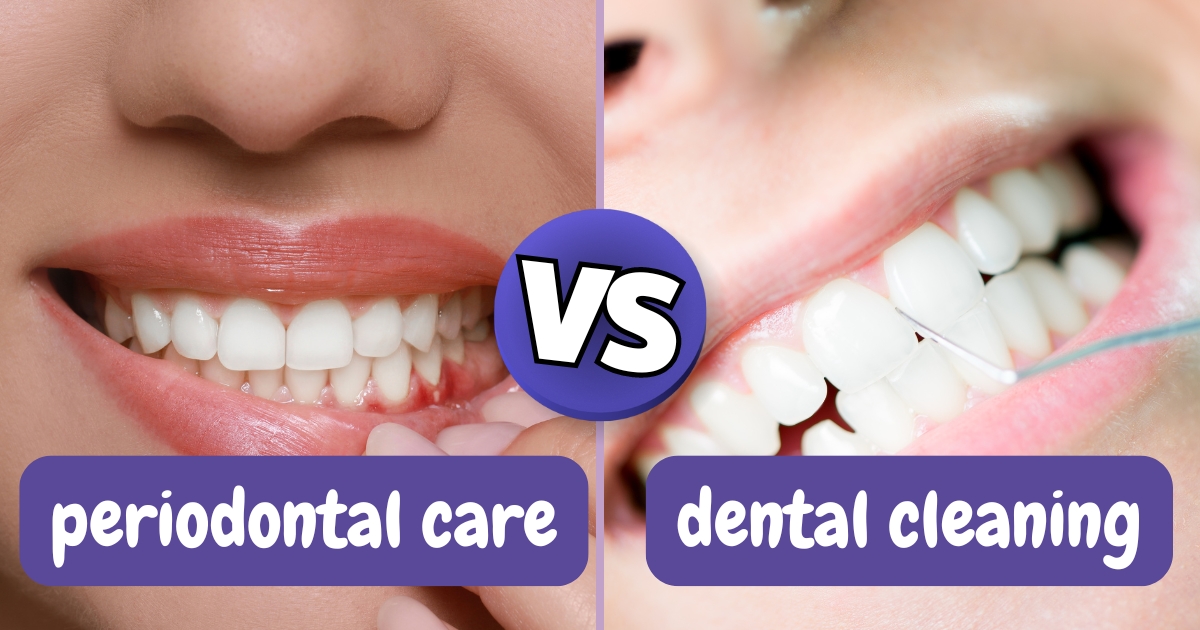
When it comes to keeping your smile healthy and bright, understanding the different types of dental care is crucial. Regular dental cleanings and periodontal care are key to maintaining oral health. But what sets them apart, and how do you know which is right for you? Let’s dive into these essential dental treatments to clear up any confusion about periodontal care vs. regular cleanings.
Regular dental cleanings are the backbone of preventive care, focusing on removing plaque and tartar to keep your teeth and gums in top shape. Periodontal care, on the other hand, targets more complex issues related to gum disease and requires specialized treatment. By understanding the differences, you can make informed decisions about your dental health and ensure you get the appropriate care when needed.
Ready to unravel the mystery of these two types of dental treatments? Let’s explore what makes each unique and why it matters for oral health.
What Is Periodontal Care?
Periodontal care is essential for managing and treating gum disease and other related issues. It goes beyond routine cleanings to address deeper problems affecting the gums and bone structures supporting your teeth.
- Definition and Purpose: Periodontal care treats and prevents gum disease (periodontitis) and other serious oral health issues. It aims to restore gum health, reduce inflammation, and prevent tooth loss.
- Typical Procedures: Common procedures include scaling and root planing, gum grafts, and pocket reduction surgery. These treatments clean below the gum line, repair damaged tissue, and address bone loss.
- Situations Necessitating Care: You may need periodontal care for symptoms like persistent gum bleeding, deep gum pockets, or severe gum recession. This care is crucial for individuals with advanced gum disease or those who haven’t responded to regular cleanings.
What Is Regular Dental Cleaning?
Regular dental cleanings are a cornerstone of preventive dental care. They help maintain oral health and catch issues before they become severe.
- Definition and Purpose: Regular cleanings, also known as prophylaxis, remove plaque and tartar build-up from teeth to prevent cavities, gum disease, and bad breath.
- Standard Procedures: Typically, a dental hygienist uses specialized tools to clean your teeth above the gum line, polish them, and sometimes apply fluoride treatment. Cleanings are usually scheduled every six months.
- Benefits: Regular cleanings help keep your teeth and gums healthy, reduce the risk of developing dental issues, and ensure a bright, clean smile.
Key Differences Between Periodontal Care and Regular Cleanings
Understanding the differences between periodontal care and regular cleanings can help you choose the proper treatment for your needs.
- Procedures and Techniques: Regular cleanings involve basic plaque removal and polishing, while periodontal care includes deeper procedures like scaling and root planing to address gum disease.
- Depth and Scope: Periodontal care targets deeper gum pockets and bone issues, whereas regular cleanings focus on surface-level maintenance.
- Addressing Issues: Regular cleanings are preventive and designed to maintain health, while periodontal care treats existing problems and prevents progression.
When to Choose Periodontal Care Over Regular Cleanings
Not all dental issues can be managed with standard cleanings. Here are some times when you might need more specialized care.
- Indicators for Periodontal Care: If you experience symptoms like swollen gums, persistent bad breath, or loose teeth, periodontal care may be necessary. These signs often indicate advanced gum disease.
- Conditions Requiring Specialized Treatment: Conditions such as severe periodontitis, significant gum recession, or substantial bone loss typically require periodontal interventions.
- Impact of Delaying Treatment: Ignoring the need for periodontal care can lead to worsening gum disease, tooth loss, and other serious health issues.
Benefits of Regular Dental Cleanings
Regular dental cleanings offer numerous advantages for your oral health.
- Preventive Aspects: Consistent cleanings help prevent plaque build-up, cavities, and gum disease, keeping your mouth healthy and fresh.
- Maintaining Oral Health: Regular visits to the dentist ensure that minor issues are addressed before they escalate, preserving your oral health.
- Long-Term Benefits: Routine cleanings contribute to overall well-being by preventing severe dental problems and maintaining a beautiful, healthy smile.
The Role of At-Home Oral Hygiene
A daily oral care routine is crucial in maintaining dental health during professional visits.
- Importance of Daily Care: Brushing twice daily and flossing daily are essential for removing plaque and preventing tooth decay and gum disease.
- Maintaining Health: Regular use of mouthwash and maintaining a balanced diet further supports oral hygiene.
- Complementing Professional Care: At-home care works with professional cleanings to ensure comprehensive dental health.
Choosing the Right Care for Your Needs
Determining the best type of care for your oral health involves understanding your specific needs and discussing them with your New Port Richey dentist.
- Factors to Consider: When deciding between regular cleanings and periodontal care, consider your oral health history, current symptoms, and any recommendations from your dentist.
- Discussing with Your Dentist: Your dentist can provide personalized advice and help develop a treatment plan that fits your needs.
- Importance of Personalization: Tailored treatment plans ensure you receive the most effective care for your oral health situation.
Understanding the difference between periodontal care and regular dental cleanings can transform oral health. While routine cleanings maintain your smile, periodontal care tackles deeper, more complex issues. By recognizing when each type of care is needed, you can better manage your dental health and prevent future problems. Don’t wait for symptoms to worsen—schedule regular check-ups and discuss your specific needs with your dentist. Your proactive approach will ensure a healthier, brighter smile for years to come.